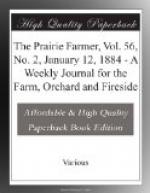It is not improbable that a man may say, I begin to believe that few horses that have done work are quite sound; but a sound one I will have; I will, therefore, buy a four-year old, that has never done a day’s work. We will acknowledge that if he does so, he may probably get his desideratum; but do not let him make too sure of this. There are such things as four-year olds, unsound, as well as worked. But, supposing him to have got this sound animal; what has he got? An animal that he has to run the risk of making useful, so far as teaching him his business goes; and by the time this is effectually done, and the colt has arrived at a serviceable age, he will probably be quite as unsound as many of those he has rejected; independent of which, and supposing him to continue sound, the breeder of this horse must have better luck or better judgment in breeding than his neighbors, if more than one in five or six that he does breed turn out desirable horses in every respect. If he turns out but a middling sort of beast, it is but small satisfaction to know that he is sound; in fact, so little satisfaction should we feel, that, if we were compelled to keep and use him, so far from rejoicing that he was sound, we should only regret that he was not dead.
In relations to the doings of dealers in horses, it is not our present object to expose the tricks of the trade, or to prejudice the unsophisticated buyer against all horse dealers. There are honest horse dealers, and there are dishonest ones; and we are sorry to say that, in numbers, the latter predominate; that honesty in horse dealing is not proverbial. But horse dealers, like other mortals, are apt to err in judgment; and all their acts should not be set down as willful wrong-doings. However, be their acts what they may, the general verdict is against their motives. Therefore, supposing we could bring any person or number of persons to believe the fact that a man conversant with horses might sell, as a sound horse, one that might, on proper inspection, be returned as unsound, all that we could say or write, would never convince the majority of persons that a dealer could innocently do the same thing. If his judgment errs, and leads him into error as to the soundness of his horse, it is set down, not as willful or corrupt perjury as to oath, but most undoubtedly as to his word and honesty.




